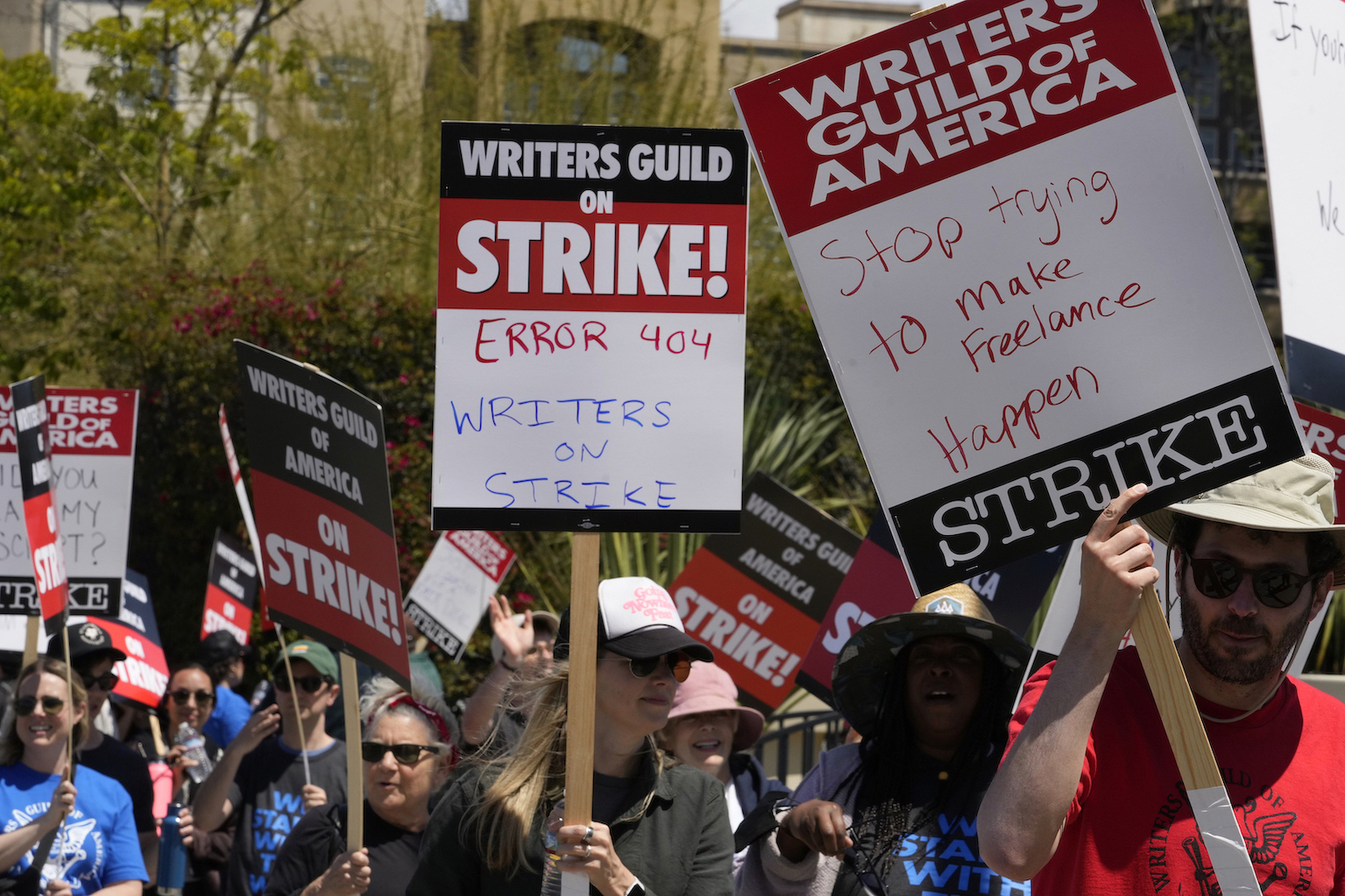After six weeks of failed negotiations with the Alliance of Motion Picture and Television Producers (AMPTP), over 11,000 U.S. film and television writers swapped their pencils for picket signs on Tuesday morning.
The Writers Guild of America (WGA) announced the strike in a statement on Monday, calling the AMPTP’s responses to their proposals “wholly insufficient given the existential crisis writers are facing.” The strike marks the first in Hollywood in over 15 years, since the last WGA strike from 2007 to 2008.
Along with better pay and a new process for streaming residuals, the WGA is asking for the implementation of mandatory minimum staffing, increased contributions to health and pension funds and regulations on the use of AI.
Up against media giants like Netflix, Amazon, Apple and Disney, WGA members have shown overwhelming solidarity. Ninety-eight percent of eligible members voted in favour of the strike at a 79 percent voter turnout—a record high for both in the union’s history. Big names in queer media voiced their support both online and offline, with Bowen Yang, Natasha Lyonne and co-creator of Amazon’s A League of Their Own Will Graham spotted on the picket lines.
For queer and trans writers trying to succeed in the industry, the issues on the bargaining table are especially pertinent.
“Some of the issues that have brought us to having to go on strike are things that have disproportionately affected LGBTQ2S+ writers and the stories that we get to tell,” Robert Forman, a writer and co-chair of WGA West’s LGBTQ+ Writers Committee, tells Xtra.
The major issue at stake is writers’ compensation in an evolving media landscape. Prior contracts failed to adequately account for the impact of new technology like streaming services and AI, according to the WGA. On top of the existing subscriber-based model, writers are pushing for viewership-based residual payments to reward the creatives behind streamers’ biggest hits—a proposal the WGA says the AMPTP refused outright.
“The sad thing is that they [the AMPTP] simply refuse to acknowledge many of the issues that we brought up,” says Forman. “Technology has shifted how we all consume media and it’s time for our contracts to reflect reality.”’
Why are writers on strike?
“The companies’ behaviour has created a gig economy inside a union workforce, and their immovable stance in this negotiation has betrayed a commitment to further devaluing the profession of writing,” said the WGA in their press statement.
According to figures released by the WGA, the AMPTP rejected their request for pay and benefits increases of $429 million over three years, instead offering only $86 million.
As series production budgets have increased, writers’ paycheques have been slashed. The WGA reports that median weekly pay for writers and producers on episodic series has plummeted by four percent in the last decade. When adjusted for inflation, the figure soars to 23 percent. The change is largely attributed to an influx of writers working for the minimum required pay regardless of experience.
One of the WGA’s demands is to regulate the practice of “mini rooms,” a condensed version of a regular writers’ room with about half the staff. Mini rooms arise when studios want to see additional scripts before formally ordering a pilot to series or renewing a show, a practice the WGA says has been increasingly abused to underpay writers. Since no production commitment is in place, experienced writers can find themselves working for minimum rates.
“If someone with 20 years of experience costs the same amount of money as someone with one year of experience, who are you gonna hire? You’re gonna hire the veteran,” says Forman.
The pervasiveness of mini rooms makes it harder for new writers to break into the industry, many of whom come from identity groups historically excluded from Hollywood writers’ rooms.
“That is part of the reason why it is so hard for newer voices and newer members to find their first job,” says Forman. “That doesn’t just affect LGBTQ2S+ writers, but as a marginalized group, it does affect us more because we are still making inroads to get parity within the industry.”
Brittani Nichols, a writer on Abbott Elementary and WGA captain, has also expressed concerns about how these norms negatively affect marginalized writers. In a thread on Twitter, she criticized the new industry norm of paying minimums as disincentivizing studios from promoting writers, leaving many people of colour stuck at the staff writer level, where 98 percent of writers make the minimum rate.
Another factor making it difficult for marginalized writers to advance to higher positions is the rate at which shows centring queer and trans stories and characters are cancelled—shows that are more likely to staff queer and trans writers. According to data from GLAAD, 54 LGBTQ2S+-inclusive series were cancelled in the 2022–2023 season alone.
Forman says that working as a staff writer for a show that gets cancelled after one season means your experience might not be recognized when hired on a new show, especially for a competing network. To mitigate this, he calls on studios to hire queer and trans writers regardless of the production’s content. “We don’t want you to only hire us if you have characters that reflect us.”
What will happen to my favourite queer shows?
Since broadcast networks, streamers and movie studios have a backlog of already-scripted or filmed content to get through, audiences are unlikely to feel the effects of the strike any time soon. Unlike in 2007, this strike hit during most productions’ off-season. Only a few scripted series were immediately shut down—fan-favourite queer teen cannibal show Yellowjackets among them—but delays to fall programming could occur if the strike continues.
Most immediately affected are late-night talk shows and variety shows like Saturday Night Live, which cancelled its forthcoming Pete Davidson–hosted episode. Reality TV, entertainment news, daytime talk shows and most animation are not written under a WGA contract and won’t see direct effects besides a possible increase. The100-day WGA strike in 2007–2008 resulted in an uptick in reality TV and game shows, especially; a result we could expect again.
While there’s no telling when the strike will end, it appears the WGA plans to picket until at least May 15, when they’re staging rallies on both coasts.
Forman wants people not in the industry who may fear for their favourite shows to know that “the writers are right there with you.
“Writers want to write. But we also want to be compensated fairly for the system in which we are writing.”


 Why you can trust Xtra
Why you can trust Xtra


